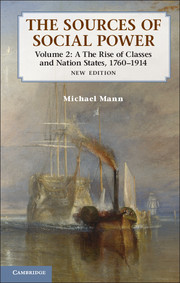Book contents
- Frontmatter
- Contents
- Preface to the new edition
- Preface
- 1 Introduction
- 2 Economic and ideological power relations
- 3 A theory of the modern state
- 4 The Industrial Revolution and old regime liberalism in Britain, 1760–1880
- 5 The American Revolution and the institutionalization of confederal capitalist liberalism
- 6 The French Revolution and the bourgeois nation
- 7 Conclusion to Chapters 4–6: The emergence of classes and nations
- 8 Geopolitics and international capitalism
- 9 Struggle over Germany: I. Prussia and authoritarian national capitalism
- 10 Struggle over Germany: II. Austria and confederal representation
- 11 The rise of the modern state: I. Quantitative data
- 12 The rise of the modern state: II. The autonomy of military power
- 13 The rise of the modern state: III. Bureaucratization
- 14 The rise of the modern state: IV. The expansion of civilian scope
- 15 The resistible rise of the British working class, 1815–1880
- 16 The middle-class nation
- 17 Class struggle in the Second Industrial Revolution, 1880–1914: I. Great Britain
- 18 Class struggle in the Second Industrial Revolution, 1880–1914: II. Comparative analysis of working-class movements
- 19 Class struggle in the Second Industrial Revolution, 1880–1914: III. The peasantry
- 20 Theoretical conclusions: Classes, states, nations, and the sources of social power
- 21 Empirical culmination – over the top: Geopolitics, class struggle, and World War I
- Appendix: Additional tables on state finances and state employment
- Index
- References
3 - A theory of the modern state
Published online by Cambridge University Press: 05 July 2013
- Frontmatter
- Contents
- Preface to the new edition
- Preface
- 1 Introduction
- 2 Economic and ideological power relations
- 3 A theory of the modern state
- 4 The Industrial Revolution and old regime liberalism in Britain, 1760–1880
- 5 The American Revolution and the institutionalization of confederal capitalist liberalism
- 6 The French Revolution and the bourgeois nation
- 7 Conclusion to Chapters 4–6: The emergence of classes and nations
- 8 Geopolitics and international capitalism
- 9 Struggle over Germany: I. Prussia and authoritarian national capitalism
- 10 Struggle over Germany: II. Austria and confederal representation
- 11 The rise of the modern state: I. Quantitative data
- 12 The rise of the modern state: II. The autonomy of military power
- 13 The rise of the modern state: III. Bureaucratization
- 14 The rise of the modern state: IV. The expansion of civilian scope
- 15 The resistible rise of the British working class, 1815–1880
- 16 The middle-class nation
- 17 Class struggle in the Second Industrial Revolution, 1880–1914: I. Great Britain
- 18 Class struggle in the Second Industrial Revolution, 1880–1914: II. Comparative analysis of working-class movements
- 19 Class struggle in the Second Industrial Revolution, 1880–1914: III. The peasantry
- 20 Theoretical conclusions: Classes, states, nations, and the sources of social power
- 21 Empirical culmination – over the top: Geopolitics, class struggle, and World War I
- Appendix: Additional tables on state finances and state employment
- Index
- References
Summary
Chapter 1 distinguishes clearly between military and political power. Yet modern states seem to merge the two, since they formally monopolize the means of military violence. This did not end the autonomy of military power organization, as Chapters 12 and 21 make clear, but it redirected it through organizations that were formally the state's. Hence this chapter treats military power within a broader discussion of political power.
I review five current theories of the state, plus the political concepts of Max Weber. I then proceed in three stages to my own theory. I begin with an “institutional” definition of the state and seek to specify the many institutional particularities of modern states. Then I seek to simplify this complexity by moving to a “functional” analysis, offering a polymorphous view of state functions. I assert that modern states “crystallized” (over the area covered in this volume) in several principal forms. Responding to the other three sources of social power, they crystallized as capitalist, as moral-ideological, and as militarist. Responding to their own political struggles, they crystallized at variable points on two continua, one “representative,” running in this period from autocratic monarchy to party democracy; the other “national,” from centralized nation-state to a loosely confederal regime. Most diffusely, they also crystallized as patriarchal, regulating gender and family relations. Finally, I discuss whether we can detect relations of hierarchy among these, so that one or more crystallizations may ultimately determine the overall character of the state.
- Type
- Chapter
- Information
- The Sources of Social Power , pp. 44 - 91Publisher: Cambridge University PressPrint publication year: 2012



